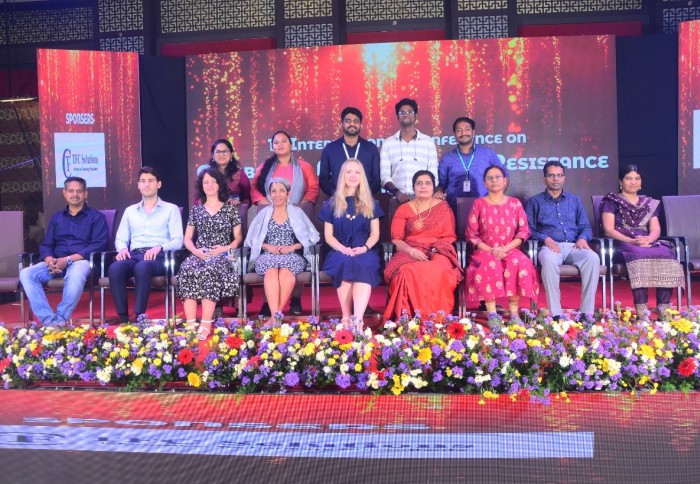AMRWATCH India visit
by Anna Freeman

Imperial researchers helped organise and deliver two international events in Puducherry, India, as part of the AMRWATCH project
In October 2022, Imperial’s Centre for Environmental Policy teamed up with the Department of Infectious Disease to help organise and deliver two international events in Puducherry, India, as part of the AMRWATCH project, jointly funded by the NERC (UK), and the Indian Government Department of Biotechnology, Ministry of Science and Technology.
 The first event - International Conference on Antimicrobial Resistance (AMR) and Microbiome under Changing Climate, organised in partnership with the Department of Microbiology, School of Life Sciences, Pondicherry University - took place between 10th-12th October. This was closely followed by a second event, the International Conference on Combating Antimicrobial Resistance, which was organised by and held at the Aarupadai Veedu Medical College & Hospital (AVMC & H), India, between 13th-14th October.
The first event - International Conference on Antimicrobial Resistance (AMR) and Microbiome under Changing Climate, organised in partnership with the Department of Microbiology, School of Life Sciences, Pondicherry University - took place between 10th-12th October. This was closely followed by a second event, the International Conference on Combating Antimicrobial Resistance, which was organised by and held at the Aarupadai Veedu Medical College & Hospital (AVMC & H), India, between 13th-14th October.
During both conferences, our team led by Professor Nick Voulvoulis and Professor Shiranee Shriskandan presented their talks on the role of antibiotic manufacturing as a source of AMR in the environment, history of antibiotic research, fight against AMR in the UK, and the study of genomics to track AMR.
These events brought together India’s chemists, biologists, environmental and medical professionals, hospital practitioners and students to discuss the issues and opportunities related to AMR, and how policy regulating antibiotic production and consumption could mitigate future public health risks and strengthen India’s ability to tackle AMR.
An insightful stakeholder discussion on manufacturing regulations and AMR proliferation in the environment also took place in Puducherry. Representatives from hospitals, research centres and environmental pollution control, engaged passionately, expressing a strong interest in mitigating chemical and AMR pollution risks.
 Both conferences opened with traditional fire-lighting ceremonies and closed with a heart-warming and spectacular gala dinner. All part of the magnificent Indian hospitality. Our team also visited university research facilities and sampling sites. These are places of outstanding natural beauty that serve as an alarming reminder of how fragile the Indian natural world can be.
Both conferences opened with traditional fire-lighting ceremonies and closed with a heart-warming and spectacular gala dinner. All part of the magnificent Indian hospitality. Our team also visited university research facilities and sampling sites. These are places of outstanding natural beauty that serve as an alarming reminder of how fragile the Indian natural world can be.
This visit also drew attention from one of India’s major national newspapers, The Hindu, which published an article: ‘Meet focuses on threat of anti-microbial resistance’ raising awareness of AMR risks from manufacturing facilities.
AMRWATCH aims to encourage and support the Indian government in its determination to monitor and regulate antibiotic discharges from manufacturing, while supporting global efforts to combat AMR.
Article supporters
Article text (excluding photos or graphics) © Imperial College London.
Photos and graphics subject to third party copyright used with permission or © Imperial College London.
Reporter
Anna Freeman
Centre for Environmental Policy